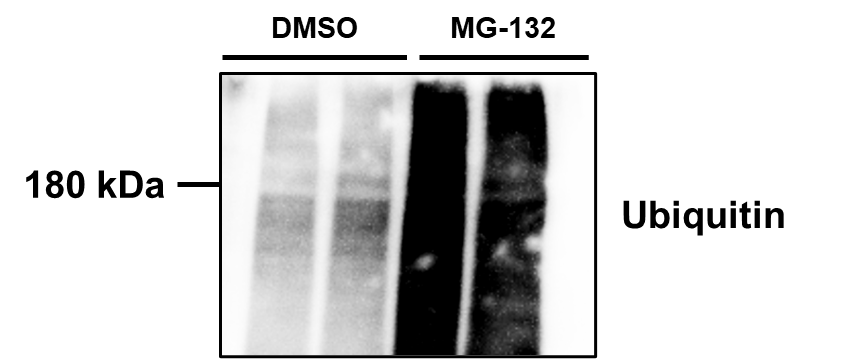Human Ubiquitin Antibody Summary
Accession # P0CG47
Applications
Please Note: Optimal dilutions should be determined by each laboratory for each application. General Protocols are available in the Technical Information section on our website.
Scientific Data
 View Larger
View Larger
Detection of Human Ubiquitin by Western Blot. Western blot shows lysates of HepG2 human hepatocellular carcinoma cell line untreated (-) or treated with MG132. PVDF membrane was probed with 0.1 µg/mL of Rabbit Anti-Human Ubiquitin Monoclonal Antibody (Catalog # MAB8595) followed by HRP-conjugated Anti-Rabbit IgG Secondary Antibody (Catalog # HAF008). Specific bands were detected for Ubiquitin at various molecular weights (as indicated). This experiment was conducted under reducing conditions and using Immunoblot Buffer Group 1.
 View Larger
View Larger
Detection of Ubiquitin by Western Blot. Western blot shows Di-Ubiquitin chains of the indicated linkage type loaded at 5 ng/lane. PVDF membrane was probed with 0.1 µg/mL of Rabbit Anti-Human Ubiquitin Monoclonal Antibody (Catalog # MAB8595) followed by HRP-conjugated Anti-Rabbit IgG Secondary Antibody (Catalog # HAF008). Specific bands were detected for Di-Ubiquitin as indicated. This experiment was conducted under reducing conditions and using Immunoblot Buffer Group 1.
Preparation and Storage
- 12 months from date of receipt, -20 to -70 °C as supplied.
- 1 month, 2 to 8 °C under sterile conditions after reconstitution.
- 6 months, -20 to -70 °C under sterile conditions after reconstitution.
Background: Ubiquitin
Ubiquitin is a 76 amino acid, highly conserved nuclear and cytoplasmic protein. It is found exclusively in eukaryotes, becomes covalently attached to substrate proteins by enzymes in the Ubiquitin-Proteosome Pathway (UPP) and has a major role in targeting cellular proteins for the ATP-dependent degradation by the 26S proteosome. Ubiquitination also affects proteosome-independent events such as protein localization, activity and function.
Product Datasheets
Citations for Human Ubiquitin Antibody
R&D Systems personnel manually curate a database that contains references using R&D Systems products. The data collected includes not only links to publications in PubMed, but also provides information about sample types, species, and experimental conditions.
3
Citations: Showing 1 - 3
Filter your results:
Filter by:
-
Restoring autophagic flux attenuates cochlear spiral ganglion neuron degeneration by promoting TFEB nuclear translocation via inhibiting MTOR.
Authors: Ye B, Wang Q, et al.
Autophagy
-
Specific branches of the proteostasis network regulate the toxicity associated with mistranslation
Authors: McDonald, DW;Dib, RN;De Luca, C;Shah, A;Duennwald, ML;
Nucleic acids research
Species: Yeast
Sample Types: Cell Lysates
Applications: Western Blot -
NEDDylated Cullin 3 mediates the adaptive response to topoisomerase 1 inhibitors
Authors: A Meroni, J Grosser, S Agashe, N Ramakrishn, J Jackson, P Verma, L Baranello, A Vindigni
Science Advances, 2022-12-09;8(49):eabq0648.
Species: Human
Sample Types: Cell Lysates
Applications: Western Blot
FAQs
No product specific FAQs exist for this product, however you may
View all Antibody FAQsReviews for Human Ubiquitin Antibody
Average Rating: 5 (Based on 2 Reviews)
Have you used Human Ubiquitin Antibody?
Submit a review and receive an Amazon gift card.
$25/€18/£15/$25CAN/¥75 Yuan/¥2500 Yen for a review with an image
$10/€7/£6/$10 CAD/¥70 Yuan/¥1110 Yen for a review without an image
Filter by:


